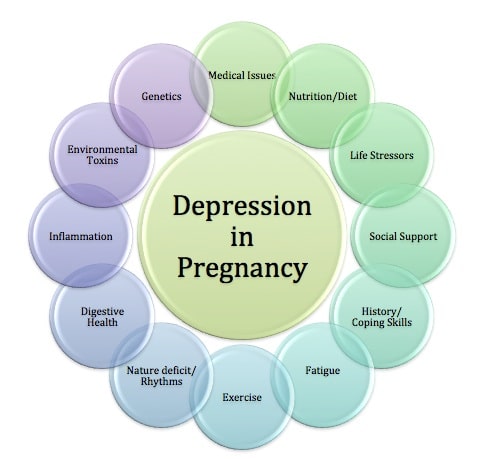Overcoming Depression During Pregnancy: Tips 2023
May is a Maternal Mental Health awareness month and gives us a great opportunity to talk more about it. Pregnancy is a complex physiological state that comes with a lot of changes. No wonder, during pregnancy, our mental health may be challenged the same way as our muscles, ligaments, and bones.
Among the most common mental issues that pregnant women face is depression. It is a mood disorder caused by disturbances of certain chemicals in the brain. It is not something you can turn on and off. Studies confirm that 30% of pregnant women would experience some depression throughout gestation, with 9% meeting the criteria of major depression. The symptoms are more common during the 1st and 3rd trimesters of pregnancy.
Why is Depression More Common During Pregnancy?
There are many factors to blame for this:
- Firstly, the abundance of new hormones (mainly produced by the placenta) interferes with how neurotransmitters (mood-defining substances) are produced. The constant change in the body may affect a woman’s confidence and add to mood issues.
- Depression during pregnancy is more likely if there was a depressive episode in the past, a family history of depression, sexual abuse, or substance abuse.
- A poor diet that is low in nutrients may also trigger depression due to the lack of vital vitamins and micro-elements.
- Even dehydration may be the reason for depressive thoughts (having miserable feelings during vomiting in early pregnancy).
- Challenging situations like a stressful job, being single or financial issues may trigger depression during pregnancy as well.
What are the Signs and Symptoms of Antenatal Depression?

- Loss of interest in things you normally love.
- Inability to sleep or excess of sleep.
- Frequent anxiety about yourself and your baby.
- Fear of labor and not being able to be a good mother.
- Loss of sexual drive.
- Feeling miserable and hopeless.
- Decrease in appetite.
- Suicidal thoughts.
How to Tackle Depression During Pregnancy?
- Talk to your doctor: This might be the first person who will be supportive and able to help.
- Consistent sleep schedule: Regular circadian rhythm can work magic.
- Share your feelings: Talk about your feelings/ thoughts with your partner, mom, and best friend.
- Journaling: If you are not good at expressing your feelings to others, you can also write them down.
- Take a walk: It doesn’t have to be a long walk. You can take a brief walk to get some air and sunlight and breathe in some fresh air.
- Take your prenatal vitamins regularly: A good prenatal vitamin should contain Methyl folate, Vitamin B6, Vitamin B12, Omega-3, and Choline. Taking additional Magnesium and Vitamin D tablets can be very helpful too.
- Hydrating yourself: Water serves as a coolant for your brain. Make sure to drink a minimum of 2 liters of water per day.
- Exercise regularly: A good workout results in the release of endorphins, hormones responsible for making you feel good.
- A good breakfast: Start your day with a good savory breakfast full of proteins (amino acids) and good fats necessary to produce neurotransmitters responsible for our emotions.
- Consult a mental health professional: Psychotherapy can effectively address the trauma preceding the pregnancy.
- Try homeopathic remedies: Pulsatilla, Sepia, and Ignatia are effective alternatives to conventional anti-depressants, which can be taken without fear of having any side effects.
- Consider taking anti-depressants: Anti-depressants can be taken during pregnancy even though conventional medicine does not suggest taking them due to certain risks.
What are the Potential Risks of Taking Anti-Depressants During Pregnancy?
- Selective serotonin reuptake inhibitors (SSRI) – especially paroxetine and venlafaxine- are associated with an increased risk of miscarriage.
- A combination of two or more anti-depressants doubles the risk of miscarriages.
- Taking SSRI is linked to persistent pulmonary hypertension in newborns.
- Some studies have suggested that newborns may experience withdrawal symptoms if mothers take the medication in the 3rd trimester.
- Some anti-depressants are associated with a cardiac malformation in the fetus.
- Children of women who took SSRIs while pregnant have a 37% greater risk of speech or language disorders.
Ensure your obstetrician knows you are taking anti-depressants during pregnancy. Despite all these risks, it is unwise to stop taking anti-depressants during pregnancy if you used to take them before.
What are the Risks of Stopping Anti-Depressants During Pregnancy?
- Stopping anti-depressants during pregnancy may cause a relapse in up to 60-70% of cases.
- Untreated antenatal depression has been associated with low maternal weight gain, increased risk of preterm birth, and low birth weight (among other effects).
- Women exposed to depression before or after birth have higher cortisol levels which seem to normalize if the depression is treated.
- Untreated depression during pregnancy is one of the highest risks for postnatal depression.
- Untreated depression is the risk factor for maternal suicide.
An Insight from Mamahood
Research conducted shows that about 7% of pregnant women experience depression during pregnancy. It is very important to get the right treatment for it. If the signs are ignored, it can be fatal for you and the baby. Watch out for suicidal thoughts and express your feelings with your partner, or a healthcare professional can help you overcome this. If you are experiencing any type of depression, you must seek help and talk to your doctor.








